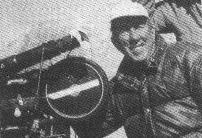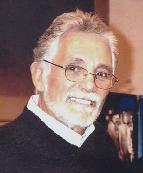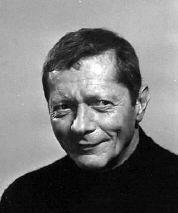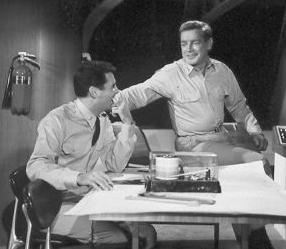|
|
|
|
In early 2005, John and Diane
Kachmar were kind enough to help me connect with David
Hedison. I had long wanted to ask a few specific questions
about his experiences on stage and his memories of working on
Voyage. I had trepidation's going in, not wanting to pose the
same questions asked a hundred times before, or at least not wanting
to pose them in the same way. The interview, conducted via
email in one pass, did not facilitate back and forth interaction, but I
was pleased to get David's responses. The interview begins with a few thoughts
on acting and theater and then moves on to the Voyage
years. Thanks, John and Diane, and certainly, thank you very
much, David Hedison.
---Michael
Bailey |

|
Mike: Did you work directly with Lee Strasberg
at The Actor's Studio and if so, what do you
remember about the man?
David: I did one scene for Lee at the Actorsí Studio ----
"Franny and Zooey" with Rosemary Murphy (1953). At the studio
I did several other scenes when the other teachers were moderating
---- Estelle Parsons, Martin Landau, Ellen Burstyn, etc., etc.
As a teacher I thought Lee was marvelous ---- but I preferred
Sandy Meisner
at the Neighborhood Playhouse in NY.
Mike:
Do you still use Strasberg's training?
David:
I work from the inside out, which is the way most actors at the
studio work. The method to me is just preparing and then
performing in the most truthful and honest way possible. As
the French would say: Mettez-vous dans de la peau de la bette. (Get
yourself within the skin of the animal.)
Mike: What work have you done where
you felt you most honestly delivered the goods to your audience
(chugging on all cylinders) . . . and why?
David: I remember a performance as MacDuff
in "MacBeth" ---- circa 1953 with Louisa Horan as Lady
MacBeth. Hot stuff.
Mike: Film acting seems so different from
the stage (a cold camera staring at you rather than a living,
breathing audience) . . . is there any comparison in the way you
prepare the work? Is the "charge" you get out of the
performance different because the medium is different?
David: The real "charge" comes when you are
working in the Theatre ---- with a different audience every night. In film ---- you might be happy
with one scene ---- but so often you discover
itís not even in the final cut. Cíest la vie! [Thatís
life!]
Mike: Is there any particular film
(of yours) that you can view today and feel like, yeahóthat
performance was right on? Why?
David: In
film? Iím afraid not. I wish. But I donít think so.
Mike: What was your favorite stage
role?
David: The role of George in "Chapter Two"
by Neil Simon. |
|
Mike: Voyage's first season (black
and white) shows were the best, dramatically. Gritty episodes
like "Submarine Sunk Here" and "The Fear Makers" hold up well
today. If you remember these shows, did you have any sense
that these episodes were good back when you were making them?
David: I never thought much of any of the
Voyage episodes when I was filming them. The excitement came
when I would work with some of the directors like Leonard Horn,
Sutton Roley, Jerry Hopper. And of course there was always Basehart
to keep me from getting depressed. |
|

| The versatile Sutton
Roley | |
|
Mike: Have you changed your
attitude on the Voyage shows after seeing them again years later?
Were there any that you liked better on a second
viewing?
David: Iíve seen a
few episodes over the years, and I have to admit that I was very
proud over much of what I saw. The chemistry between Crane and
the Admiral was perfect. And the ensemble work with Dowdell,
Becker, Monroe and Hunt and everyone else was joyous. I
realize now that those four years (Ď64-68) have been one of the
major highlights of my life.
Mike: What in your opinion was the
worst Voyage episode ever made?
David: Fossil
Men. |
| The
talented Alfred Ryder | |
|
Mike: One of your
favorite episodes is
Return of the
Phantom
. Sutton
Roley directed both Phantom shows and he pulled out all the stops
with creative set-ups and directorial tricks. Do you recall
any of this? Was it fun doing those
shows?
David : It was
great fun working on "The Phantom" with Sutton. When I heard Irwin
Allen was doing a "Return of..." I was overjoyed. Alfred
Ryder was such a fine actor. At one time,
I started working on a German accent for the part. But
the--when the time came, I discovered that Alfred's accent was quite
different from mine--although quite unique and interesting. I
watched his work constantly, studied that accent of his while
watching the dailies and did my damndest to grab onto his
sound. I think I succeeded. |
|
Mike: What is the single most vivid
memory you have of doing Voyage? I don't necessarily mean of acting
on the show, or a favorite story. Just curious.
David: The single most vivid memory was the
realization of how lucky I was to be working with my now friend,
Richard Basehart. He taught me so much, and I will never
forget him. I was very much the extrovert at the time. Richard ----
the opposite ---- shy and very much a loner. Itís amazing how I am
getting to be more like him! What can I say? I miss him a lot.
|
|
Mike:
Did Richard Basehart know how loved and appreciated he was by his
many fans?
David: Iím sure he did. But it
never showed. I remember asking him one time when he went to
bed. His answer was 9 P.M. "What?" -- I screamed.
"Youíve got to be kidding!" You see, in those days I hit the
sack around 2 AM and would report for work ----- fresh as a daisy
---- at 7 A.M. Those were the days! Mike ---- just ask me
today what time I go to bed. I would be totally embarrassed with my
answer. Not quite 9 P.M. But close. Very close. You canít go home
again!
David Hedison
Beverly Hills
February 7,
2005 |
|
| David Hedison and good friend
Richard
Basehart.
| | |
![]()



